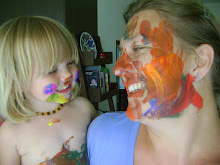
Orla turned six months shortly after our arrival for a two year stay in Penang. It seemed that a bizarre time paradox was in operation; in many ways, the previous months had flown at breakneck speed, but in others, it seemed that she had always been there. I had to stop to think about what my life had been like before. Every day, it seemed, she presented me with something new to marvel at - sitting unaided, experimenting with sounds, studying faces and expressions with grave concentration, starting the weaning process and gaining mobility.
As well as our new environment, populated by many different races and offering so many new sights, sounds, tastes and smells, Orla was beginning to explore objects at home with a new sensory awareness. I put together a ‘treasure basket’ - a heuristic play basket filled with everyday objects of different textures, shapes, weights, colours... made of any material but the all-too-common plastic used for the majority of children’s toys. Sitting on the floor, she emitted high-pitched squeaks and hiccups, mouthing a silk scarf. She rejected a cleaning sponge, but returned to it over again, both drawn to and put off by its wiry surface. A tennis ball was a challenge - she was unable to pick it up with only one little hand, but was fascinated by its luminous yellow colour. Finally she would tip the remaining contents of the basket onto the floor and would feast on the wealth of everyday treasures at her feet.
It was a new world for me, too, as I experienced it from her perspective. I relaxed to watch her at play and was struck by her tenacity. She wasn’t put off by the arduous task of trying to pick up the tennis ball, or stretching to pick up something that had fallen seemingly just out of her grasp. I watched, enthralled, as she selected an object, examining it closely, turning it over and over in her hands, before carefully raising it to her mouth to explore its texture. Even then, she showed a discerning nature, rejecting items that didn’t please her, and choosing something more satisfying instead.
Watching her watching other people was a favourite pastime of mine. Captivated by babies and animals, she squeaked and cooed with pleasure. Adults faces were studied carefully and judgments made, bestowing a sunshine smile if warranted, or burying her face in my neck if she was less certain. She was intolerant of over-familiar strangers, letting loose a howl of protest and distress if they pressed their faces too close, causing them to retreat swiftly and apologetically.
Sound came to play an increasingly key role in her world. She explored a wide gamut of vocalisations - squeals, shrieks, growls and creaks, messy, spluttering raspberries and ecstatic squeaks. Experimentation with plastic boxes and cups yielded strange, booming echoes that elicited chuckles of delight. Unfailingly, her attention was caught by music and singing. No matter how tired, irritable, bored or miserable she was, she was soothed within a minute by singing, her wails halting as she stopped to listen. I trawled through my memory for half-forgotten nursery rhymes, Beatles and Simon and Garfunkel tunes that I was brought up on, classics from vintage musicals; all were received with contented approval. I was enthralled by how innate our love of music and rhythm seems to be, how a series of notes can influence emotions so profoundly at such an early age.
It also struck me that I am one of an elite group - albeit a very large one. For so many people moving through their lives, these developments are barely noteworthy, overlooked, unimportant - but to me, and the wide and varied collective mothers across the world and throughout time, they may be miraculous and overwhelming. It’s hard to believe there will be so many, many more of them in the years ahead.
